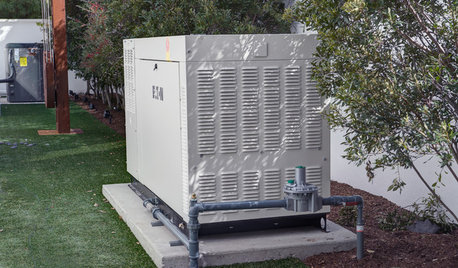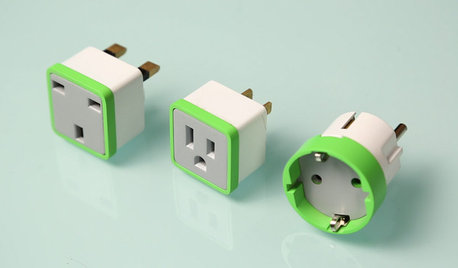Using generator to power computer?
horton
14 years ago
Related Stories

DISASTER PREP & RECOVERYMore Power to You: How to Pick the Right Generator
If your home's electricity goes, don't let it take your necessities with it — keep systems running with this guide to backup power
Full Story
GREEN BUILDINGSunlight Used Right: Modern Home Designs That Harness Solar Power
Embracing passive heating principles through their architecture, siting and more, these homes save energy without skimping on warmth
Full Story
HOME TECHWould You Use Virtual Reality to Renovate Your Home?
Architecture can be confusing, but immersion in a computer-generated 3D world soon may help
Full Story
HOUZZ TOURSHouzz Tour: Innovative Home Reunites Generations Under One Roof
Parents build a bright and sunny modern house where they can age in place alongside their 3 grown children and significant others
Full Story
HOUZZ TVHouzz TV: Cool Reclaimed Wood Projects Fill a Craftsman’s Home
Using barn wood, beadboard and beams, this homeowner has crafted furnishings and features for his family’s Chicago home
Full Story
HOME TECHPlug Into Home Power Monitors That Pay for Themselves
Stop throwing away money on wasted electricity with help from new monitors that work with your phone or computer
Full Story
GREEN BUILDINGHouzz Tour: An Energy-Efficient Home for 3 Generations
This Australian house takes sustainability and accessibility to a new level
Full Story
ARCHITECTUREMeet the Next Generation of Incredibly Adaptable Homes
Move a wall or an entire kitchen if you please. These homes scale down and switch it up with ease as needs change
Full Story
LIFEHow to Prepare for and Live With a Power Outage
When electricity loss puts food, water and heat in jeopardy, don't be in the dark about how to stay as safe and comfortable as possible
Full Story
GREEN BUILDINGOff the Grid: Ready to Pull the Plug on City Power?
What to consider if you want to stop relying on public utilities — or just have a more energy-efficient home
Full StoryMore Discussions









hrajotte
Ron Natalie
Related Professionals
Galena Park General Contractors · Ames General Contractors · Forest Grove General Contractors · Geneva General Contractors · Middletown General Contractors · Perrysburg General Contractors · Rancho Cordova General Contractors · Springfield General Contractors · Livingston Handyman · Carson Solar Energy Systems · Campbell Home Automation & Home Media · Lewisville Home Automation & Home Media · Pittsburgh Home Automation & Home Media · Port Washington Home Automation & Home Media · Scottsdale Home Automation & Home MediahortonOriginal Author
brickeyee
tjdabomb
User
tjdabomb
weedmeister
brickeyee
tjdabomb
brickeyee
Elmer J Fudd
hortonOriginal Author
bus_driver
brickeyee
yosemitebill
tjdabomb
hortonOriginal Author
brickeyee
bus_driver
countryboymo
tjdabomb
brickeyee
tjdabomb
brickeyee
tjdabomb
dkenny
brickeyee
tide-hsv
bus_driver